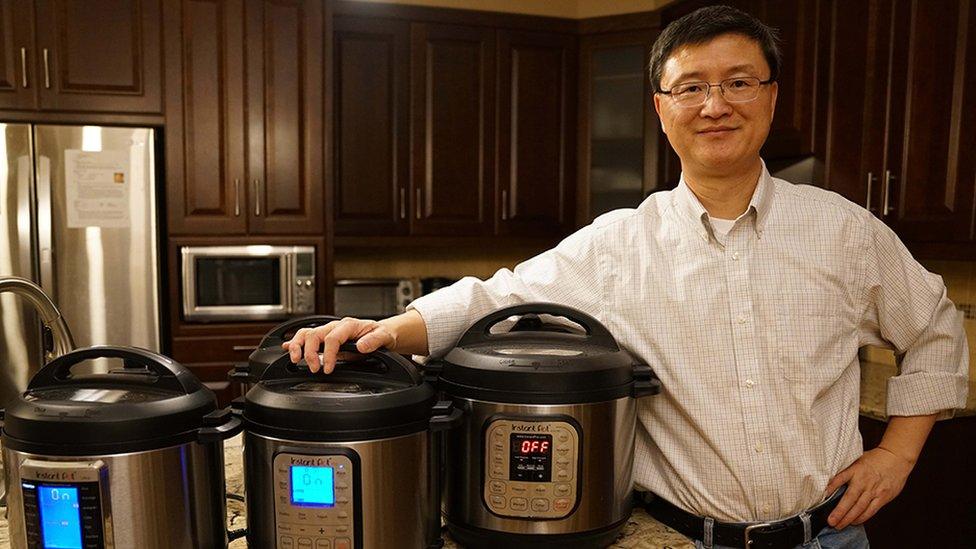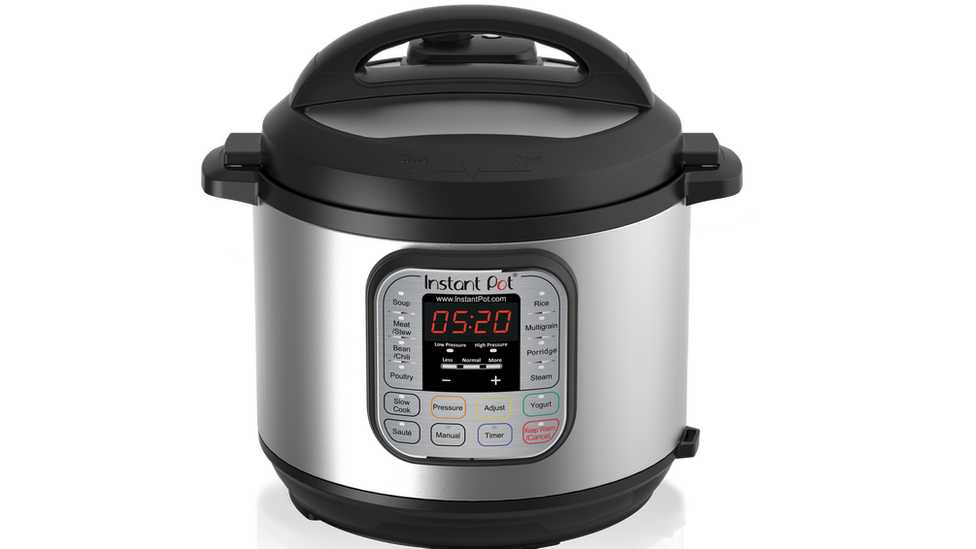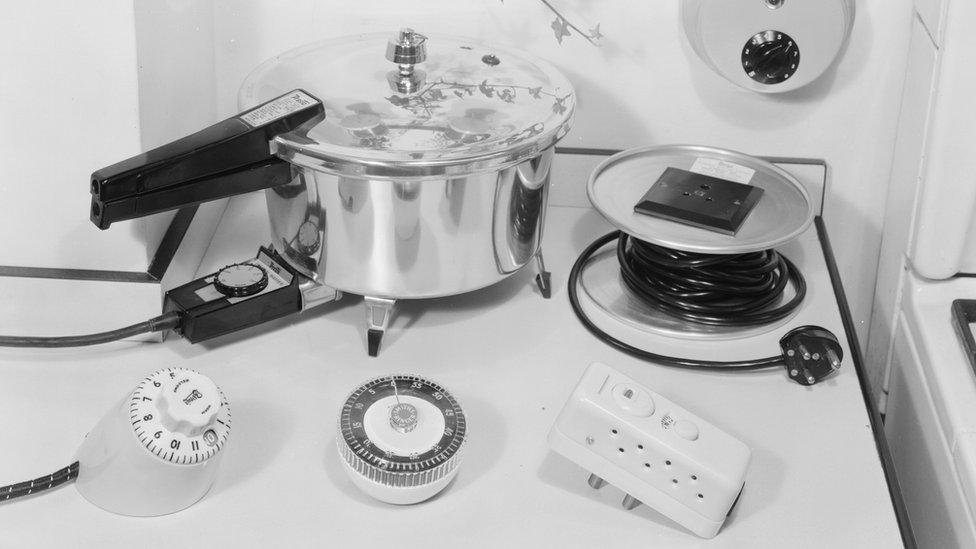How the Instant Pot cooker developed a cult following
- Published

Robert Wang and a friend came up with the idea for the product
Robert Wang was hoping to make it easier for people to make a decent meal, but didn't expect his new product to attract a cult following.
Last summer on Amazon Prime Day, the online retailer's global 24-hour annual sale event, one of the top-selling products in the US was a multi-function electric cooker.
The item in question is called the Instant Pot, and more than 215,000 of them were snapped up in the US on that single day.
The fact that this countertop appliance was outselling TVs and tablets may come as a surprise to many people, but not to its legions of dedicated fans, who express unabashed adoration.
"If you look at the Amazon reviews, one common word is 'love'," says Mr Wang.
"Americans are very open with their emotions. Love is all over the place. Another one is that 'Instant Pot changed my life'.
"That's actually rewarding to us - understanding that we have created value for society."

The Instant Pot has built up an online fanbase
First available to buy in 2010, the Instant Pot has become a veritable craze, a success built through social media word-of-mouth instead of traditional TV or print advertising.
Today, the official Instant Pot Facebook group is nearly 398,000-people strong, and there are thousands of other online enthusiasts. Fans share recipes online and tips for making everything from soups, stews and chilli, to poached eggs, popcorn and cheesecake in the appliance.
Mr Wang says that from the beginning the intention was to let the product speak for itself, and build up sales thanks to customer recommendations rather than pay for advertising.
He describes this as the "build a better mousetrap, and the world will beat a path to your door" marketing strategy.
All-in-one
The Instant Pot is the brainchild of Mr Wang and his friend Yi Qin, who are both veterans of the Canadian technology sector. Mr Wang had worked for the now-defunct telecoms group Nortel, while Mr Qin had been employed by Blackberry.
They were brainstorming ideas for a new project in 2008 and realised people were searching for the same solution they were - a way to cook healthy meals for a family quickly and affordably.

Fans of the Instant Pot post recipes and photos online
That was when their attention turned to kitchen appliances and rebooting the pressure cooker.
They came up with the idea for the Instant Pot, which is a pressure cooker, slow cooker, rice cooker, steamer, saute pan, yogurt maker, warming pot all-in-one unit.
Together with three other partners, they set up a business called Double Insight in Ottawa, the Canadian capital, and the first version of Instant Pot was born in 2010.
"We have tried to automate cooking as much as possible and tried to simplify the cooker," says Mr Qin, who is the firm's vice president of product management. "One press of the button can cook the meal for the family."

Yi Qin says that from day one they wanted the product to be as easy as possible to use
The product was, however, not an immediate success. Mr Qin says that one problem was the "stigma" surrounding one of the Instant Pot's main functions: the fact that it can be used as a pressure cooker, which had long since fallen out of favour in North American kitchens.
"Most people have some concept of urban legends of exploding pressure cookers in their grandmother's kitchens," says Mr Qin.
He says they addressed the issue by making product safety a design priority, and making the Instant Pot as foolproof to use as possible.
Thanks to word of mouth, sales were growing well by 2013 when Amazon started to sell the product, and sales shot up further.
"Amazon is a very practical company," says Mr Qin. "They didn't approach us until they saw that the [upward sales] trend had already formed."
'Tell three friends'
The online buzz surrounding the Instant Pot has been helped by food bloggers enthusiastically talking about the product, and sharing recipes, with their followers.
Some of these bloggers buy their own Instant Pot, while Double Insight gives the cookers to others to test out.

One early challenge was convincing customers the Instant Pot was safer than their grandmother's pressure cooker
Laura Pazzaglia, from website Hip Pressure Cooking, says that she is not surprised by the gadget's success.
"Everybody who has an Instant Pot, they tell three friends about it," she says. "If you keep going like that, obviously you can't help but succeed."
Today Double Insight remains a small business with just 25 employees, contracting out the manufacture of the product to a factory in China.
While the Instant Pot is facing increasing competition from rival products made by much larger appliance companies such as Breville and Black & Decker, Ms Pazzaglia says that Instant Pot's early start and vast online following gives it an edge.

Food bloggers like Laura Pazzaglia helped promote the product
Zeynep Arsel, associate professor of marketing at Montreal's Concordia University, says that the Instant Pot resonates with the trend towards healthy but uncomplicated food, and is boosted by "a textbook perfect buzz marketing campaign".
She adds: "Cooking is a social and emotional practice that creates a lot of meaning in our lives.
"So a product that takes centre stage in cooking practices also creates a sense of attachment by being an agent in our social and emotional lives."
With the Instant Pot now on to its fourth iteration, its design development has been led by feedback and ideas submitted by users. With prices starting from $80 (£65) for the most basic model, the top-of-the-range $180 version can be controlled remotely via your mobile phone.
"This is not so much an Instant Pot story per se, this is every user's story," says Mr Qin. "Whenever you have an Instant Pot product, you have a story to tell."